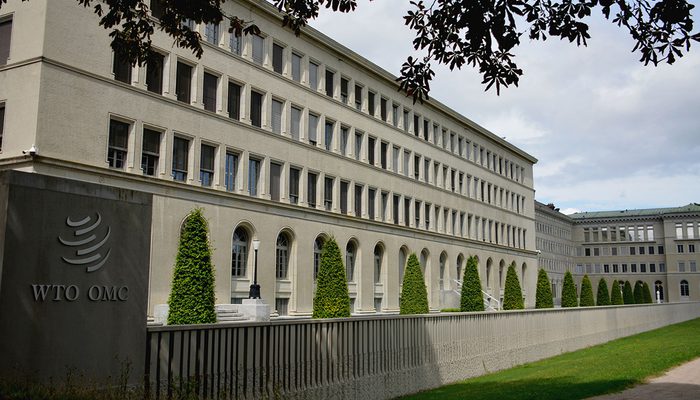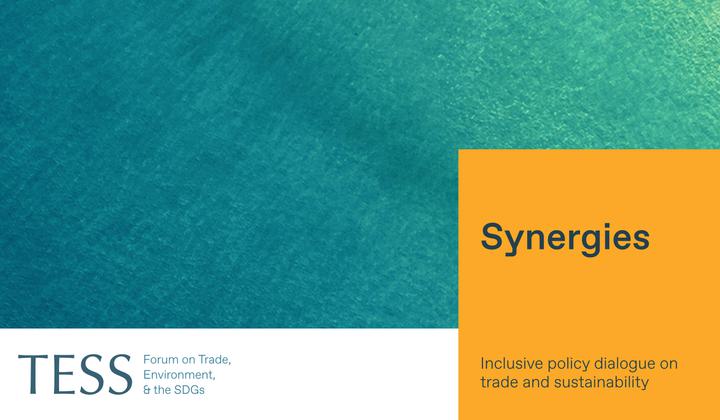This article offers five suggestions to reframe the discussion and adopt a new approach in talks on environmental goods, services, and technologies at the World Trade Organization. The suggestions aim to promote inclusive cooperation, respond to key environmental challenges, and foster benefits for developing countries.
Faced with multiple environmental crises and pressing development challenges, governments are exploring options to accelerate the transition to a more sustainable, inclusive, and resilient global economy. In this process, trade and trade policies have a critical role to play to foster the development, diffusion, affordability, and uptake of goods, services, and technologies critical to address the climate crisis, global pollution, and biodiversity loss. There is also a growing recognition of the role that trade and trade policies can play in providing market opportunities for products that are produced sustainability.
In the world of trade policymaking and diplomacy, this has prompted calls for governments to do more to facilitate and promote trade in environmental goods, services, and technologies. More broadly, it is spurring recognition that in order to achieve the scale and speed of transformation required to meet shared sustainability goals, there is a need to go beyond promoting trade in niche products and to foster a transformation of all commercial relations towards shared goals and in support of action at the national level.
An important backdrop for this discussion are longstanding efforts from developing countries to secure specific opportunities for their exports, diversify their economies, and derive greater benefits from their participation in global trade for their sustainable development priorities. In a rapidly changing market and regulatory landscape, there are fears among many developing countries and businesses that the shift towards a greener global economy will leave them behind, further marginalize their economies, and reinforce the technology and competitiveness gap between developed and developing countries. In particular, there are concerns about growing restrictions on trade in the pursuit of environmental priorities and their limited access to technologies, finance, or investment needed to propel a structural transformation addressing both urgent development and environmental priorities.
Conscious of the need to avoid past mistakes, many governments are conveying a new openness to considering different ways of approaching the topic.
At the World Trade Organization (WTO), governments are discussing issues related to trade in environmental goods and services in a number of settings including the Committee on Trade and Environment and the Council on Trade in Services. There are also discussions underway in an informal working group launched under the Trade and Environmental Sustainability Structured Discussions (TESSD). Finally, the topic has arisen in the context of the Dialogue on Plastics Pollution and Environmentally Sustainable Plastics Trade (DPP). In these discussions, a core priority of governments has been to explore ways forward that build broad-based support for future work among a wider range of members at different levels of development.
Conscious of the need to avoid past mistakes, many governments are conveying a new openness to considering different ways of approaching the topic. In today’s setting, there is no broad-based appetite for “relaunching” or “reviving” old talks at the WTO.*
Building on past lessons, we put forward five suggestions to reframe the discussion and adopt a new approach in environmental goods, services, and technologies for sustainable development at the WTO.
Suggestion 1: Start From the Environmental Problem and Work Backwards
A key mistake of past negotiations has been to spend too much time trying to define environmental goods and services. Rather, a first step should be to define the environmental problem that members are seeking to address. For example, is it climate change mitigation, climate adaptation, biodiversity loss, pollution, water scarcity, soil degradation, or desertification? Defining the objective is key not only to inform the types of goods, services, and technologies that discussions should focus on but also participation.
As discussions in the DPP illustrate, engagement of members is likely to be directly related to the imperative felt by individual members to cooperate around a particular environmental challenge. The fact that a wide range of developing countries have decided to join the DPP largely reflects the scale and urgency of the plastic pollution challenge faced by much of the developing world.
Once the environmental objective is agreed, members should work backwards to understand the role of international trade and trade policies in addressing the issue at hand and the kinds of goods, services, or technologies that may help. For example, reducing greenhouse gas emissions requires a focus on ensuring affordable and large-scale access to renewable energy and energy efficiency technologies, whereas tackling plastic pollution may require facilitating trade in sustainable and effective substitutes or environmentally sound and safe waste management goods, services, and technologies.
Suggestion 2: Move From a Market Access Agenda to a Cooperation Agenda
A second error in previous talks consisted in framing environmental goods and services as a market access discussion. There is very little appetite for such a narrow discussion among members at the WTO, nor is there a strong rationale for an agreement solely aimed at opening markets. For the most part, developing countries essentially import environmental goods and services and have limited export capacity. If developing countries need to promote imports for specific environmental purposes, they can do it unilaterally and do not need a binding WTO agreement.
In other words, as put in the TESSD ministerial statement adopted in December 2021, the talks should not be framed as a liberalization initiative but rather as “promoting and facilitating trade in environmental goods and services to meet environmental and climate goals and commitments.” Such an approach helps to shift from a purely mercantilist discussion to include an approach to trade measures and trade policy cooperation that also addresses the constraints faced by developing countries and their businesses related to trade finance, transfer of technology, or capacity building.
Suggestion 3: Focus on Identifying and Addressing Key Constraints Affecting Trade
Past discussions have wrongly assumed that removing market access barriers would automatically enhance trade in environmental goods and services. Empirical evidence suggest that the reality is more complex. For example, a review of regional trade agreements with provisions on environmental goods undertaken by the Swedish Board of Trade shows that these agreements do not affect trade flows in those goods. Similarly, several developing countries that have liberalized trade in environmental goods and services under free trade agreements claim that they are yet to see increases in the diffusion and uptake of key environmental goods, services, or technologies.
A critical lesson here is the need to identify first what really prevents trade in goods and services or the production or diffusion of technologies from happening. Depending on the sector, this may be higher tariffs, but it can also be due to a lack of finance supporting investment, differences in standards or regulations, or intellectual property and licensing costs. In such cases, the answer may be regulatory cooperation, investment facilitation, innovative licencing agreements, government procurement, or trade financing as opposed to endless discussions on lists of Harmonized System codes of products to be liberalized. Precedents of such approaches exist in regional trade agreements and could serve as inspiration.
Suggestion 4: Take a Whole of the Supply Chain Approach
Past discussions on environmental goods and services have mostly focused on technologically advanced finished goods with clear environmental end use. This approach, however, may not be appealing for many developing countries with only limited export capacities in those goods. While it may be unrealistic to assume that all developing countries could emulate China or India in building the capacities to develop entire wind farms or solar panel plants for example, a key priority for many is to integrate international production networks and possibly move up the value chain through the production of certain parts and components.
A value chain analysis involving technologies, services, and components at different stages of the life cycle may therefore broaden the opportunities to engage and help move away from fruitless discussions on the environmental credentials of specific goods and services.
Suggestion 5: Explore Alternative Outcomes
There is limited appetite among members for traditional outcomes from negotiations in the form of new schedules of commitments or binding rules in the WTO. Nor are such outcomes always appropriate to achieve a desired environmental objective. Thus, there may be value in exploring new types of outcomes, of which successful precedents exist, notably in regional trade agreements.
Possible options here include innovations in both format and the legal nature of results. On format, members could explore a series of sectoral initiatives focused on particular environmental challenges (e.g. climate adaptation) or technologies (e.g. renewable energy) with different configurations in terms of participants and issues covered. On the legal nature, depending on the challenges identified, options may include guidelines and best practices, voluntary pledges, or individual commitments based on a positive list of possible measures to facilitate and promote trade in environmental goods, services, and technologies (see Box 1).
________________________________________
Box 1. Towards an Environmental Project Approach?
A possible avenue to explore is to take a project-based approach. In the area of renewable energy, for example, trade in goods and services almost exclusively takes place under specific projects (e.g. to build a solar plant or a wind farm). Individual WTO members could agree on a voluntary basis to remove tariffs and non-tariff barriers on all goods, services, and technologies imported in the context of such environmental projects. This could also involve government procurement or trade and investment facilitation measures to expedite customs procedures. The commitments would, however, be limited to environmental projects recognized as such by the importing country. In exchange, exporting countries could commit to providing technical assistance, financing, or technology cooperation. Such an approach built around mutually beneficial partnerships would send a strong signal to investors and contribute to reducing the costs of individual projects. It would also solve the problem of the environmental credentials of specific goods and services to the extent that the preferential treatment would only apply to goods and services imported for an environmental end use. This approach was originally suggested by India in 2005 during the environmental goods and services negotiations. At the time, it did not gather consensus, partly because it would not provide sufficient predictability in terms of market access conditions. In the present context, however, where members are exploring alternative approaches, this option could be revisited as a possible outcome under ongoing discussions.
________________________________________
As WTO members explore possible options to reframe the discussion on environmental goods and services in the Committee on Trade and Environment, TESSD, or DPP, the five suggestions presented in this article can help inspire cooperation, create benefits across the diversity of the WTO membership, support environment and development outcomes, and avoid repeating past mistakes. Using an objective-based approach participants in the TESSD working group on environmental goods and services are already moving in that direction with an initial focus on clean energy and a mapping of wind and solar value chains involving technologies, services, and components at different stages of the life cycle (see here and here).
As these discussions advance, a core priority should be to address key developing country interests in the realm of trade in environmental goods, services, and technologies, including by focusing on technologies vital to addressing specific environmental challenges they face. This may require enhanced engagement of environmental ministries and constituencies in understanding where they need environmental goods, services, and technologies to support their sustainable development priorities. It should also address trade opportunities for developing countries, particularly for micro, small, and medium-sized enterprises and wider development goals. Here, key considerations include the need to promote economic diversification and employment generation, and to identify opportunities for participation and upgrading in supply chains critical to the shift to a low-carbon economy, including through value-added exports or niche products.
* WTO negotiations on environmental goods and services first started in 2001. Thirteen years later, the persisting lack of agreement on which goods and services were “environmental” and how they should be liberalized prompted a subgroup of 46 WTO members to launch a plurilateral initiative for an Environmental Goods Agreement in the hope that discussions among a smaller set of like-minded countries could facilitate convergence. However, despite intensive talks, these negotiations ultimately failed to reach consensus and have been inactive since December 2016. Since then, negotiations have shifted to the bilateral and regional levels, with regional trade agreements becoming the preferred avenue to facilitate trade in environmental goods and services.
-----
Christophe Bellmann is Head of Policy Analysis and Strategy, Forum on Trade, Environment, & the SDGs (TESS).
-----
Synergies by TESS is a blog dedicated to promoting inclusive policy dialogue at the intersection of trade, environment, and sustainable development, drawing on perspectives from a range of experts from around the globe. The editor is Fabrice Lehmann.
Disclaimer
Any views and opinions expressed on Synergies are those of the author(s) and do not necessarily reflect those of TESS or any of its partner organizations or funders.
License
All of the content on Synergies is licensed under a Creative Commons Attribution-NonCommercial-ShareAlike 4.0 International (CC BY-NC-SA 4.0)
license. This means you are welcome to adapt, copy, and share it on
your platforms with attribution to the source and author(s), but not for
commercial purposes. You must also share it under the same CC BY-NC-SA
4.0 license.
If you would like to reuse any material published here or if you have any other question related to Synergies, send an email to fabrice.lehmann@graduateinstitute.ch.
TESS at the World Trade Organization
This Synergies article is part of our initiative on supporting inclusive cooperation on trade, environment, and sustainable development at the WTO.





